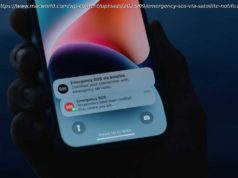Apple CEO, Tim Cook spoke up for privacy at a conference of European privacy commissioners in Brussels this morning.
Apple CEO, Tim Cook spoke up for privacy at a conference of European privacy commissioners in Brussels this morning .
The themes of this year’s conference is “Debating Ethics: Dignity and Respect in Data Driven Life», Cook is the first tech CEO to serve as the keynote speaker for the conference and was invited to speak.
He talked about data, put in a bid for a bill of U. S. digital rights, slammed competitors for profiting while unleashing powerfully negative forces, and spoke up for a GDPR-style privacy protection in the U. S.
What follows is the transcript of his speech.
Read on too to find the complete speech in video form:
«It is an honor to be here with you today in this grand hall…a room that represents what is possible when people of different backgrounds, histories, and philosophies come together to build something bigger than themselves.
«I am deeply grateful to our hosts. I want to recognize Ventsislav Karadjov for his service and leadership. And it’s a true privilege to be introduced by his co-host, a statesman I admire greatly, Giovanni Butarelli.
«Now Italy has produced more than its share of great leaders and public servants. Machiavelli taught us how leaders can get away with evil deeds… And Dante showed us what happens when they get caught.
«Giovanni has done something very different. Through his values, his dedication, his thoughtful work, Giovanni, his predecessor Peter Hustinx—and all of you—have set an example for the world. We are deeply grateful.
«We need you to keep making progress—now more than ever. Because these are transformative times. Around the world, from Copenhagen to Chennai to Cupertino, new technologies are driving breakthroughs in humanity’s greatest common projects. From preventing and fighting disease… To curbing the effects of climate change… To ensuring every person has access to information and economic opportunity.
«At the same time, we see vividly—painfully—how technology can harm rather than help. Platforms and algorithms that promised to improve our lives can actually magnify our worst human tendencies. Rogue actors and even governments have taken advantage of user trust to deepen divisions, incite violence, and even undermine our shared sense of what is true and what is false.
«This crisis is real. It is not imagined, or exaggerated, or “crazy.” And those of us who believe in technology’s potential for good must not shrink from this moment.
«Now, more than ever — as leaders of governments, as decision-makers in business, and as citizens — we must ask ourselves a fundamental question: What kind of world do we want to live in?
«I’m here today because we hope to work with you as partners in answering this question.
«At Apple, we are optimistic about technology’s awesome potential for good. But we know that it won’t happen on its own. Every day, we work to infuse the devices we make with the humanity that makes us. As I’ve said before, “Technology is capable of doing great things. But it doesn’t want to do great things. It doesn’t want anything. That part takes all of us.”
«That’s why I believe that our missions are so closely aligned. As Giovanni puts it, “We must act to ensure that technology is designed and developed to serve humankind, and not the other way around.”
«We at Apple believe that privacy is a fundamental human right. But we also recognize that not everyone sees things as we do. In a way, the desire to put profits over privacy is nothing new.
«As far back as 1890, future Supreme Court Justice Louis Brandeis published an article in the Harvard Law Review, making the case for a “Right to Privacy” in the United States.
«He warned: “Gossip is no longer the resource of the idle and of the vicious, but has become a trade.”
«Today that trade has exploded into a data industrial complex. Our own information, from the everyday to the deeply personal, is being weaponized against us with military efficiency.
«Every day, billions of dollars change hands, and countless decisions are made, on the basis of our likes and dislikes, our friends and families, Our relationships and conversations… Our wishes and fears… Our hopes and dreams.
«These scraps of data…each one harmless enough on its own…are carefully assembled, synthesized, traded, and sold.
«Taken to its extreme, this process creates an enduring digital profile and lets companies know you better than you may know yourself. Your profile is then run through algorithms that can serve up increasingly extreme content, pounding our harmless preferences into hardened convictions. If green is your favorite color, you may find yourself reading a lot of articles—or watching a lot of videos—about the insidious threat from people who like orange.
«In the news, almost every day, we bear witness to the harmful, even deadly, effects of these narrowed world views.
«We shouldn’t sugarcoat the consequences. This is surveillance. And these stockpiles of personal data serve only to enrich the companies that collect them.
«This should make us very uncomfortable. It should unsettle us. And it illustrates the importance of our shared work and the challenges still ahead of us.
«Fortunately, this year, you’ve shown the world that good policy and political will can come together to protect the rights of everyone. We should celebrate the transformative work of the European institutions tasked with the successful implementation of the GDPR. We also celebrate the new steps taken, not only here in Europe, but around the world. In Singapore, Japan, Brazil, New Zealand, and many more nations, regulators are asking tough questions and crafting effective reforms.
«It is time for the rest of the world—including my home country—to follow your lead.
«We at Apple are in full support of a comprehensive federal privacy law in the United States. There, and everywhere, it should be rooted in four essential rights: First, the right to have personal data minimized. Companies should challenge themselves to de-identify customer data—or not to collect it in the first place. Second, the right to knowledge. Users should always know what data is being collected and what it is being collected for. This is the only way to empower users to decide what collection is legitimate and what isn’t. Anything less is a sham. Third, the right to access. Companies should recognize that data belongs to users, and we should all make it easy for users to get a copy of…correct…and delete their personal data. And fourth, the right to security. Security is foundational to trust and all other privacy rights.
«Now, there are those who would prefer I hadn’t said all of that. Some oppose any form of privacy legislation. Others will endorse reform in public, and then resist and undermine it behind closed doors.
«They may say to you, ‘our companies will never achieve technology’s true potential if they are constrained with privacy regulation.’ But this notion isn’t just wrong, it is destructive.
«Technology’s potential is, and always must be, rooted in the faith people have in it… In the optimism and creativity that it stirs in the hearts of individuals… In its promise and capacity to make the world a better place.
«It’s time to face facts. We will never achieve technology’s true potential without the full faith and confidence of the people who use it.
«At Apple, respect for privacy—and a healthy suspicion of authority—have always been in our bloodstream. Our first computers were built by misfits, tinkerers, and rebels—not in a laboratory or a board room, but in a suburban garage. We introduced the Macintosh with a famous TV ad channeling George Orwell’s 1984—a warning of what can happen when technology becomes a tool of power and loses touch with humanity.
Домой
United States
USA — software Complete transcript, video of Apple CEO Tim Cook's EU privacy speech






